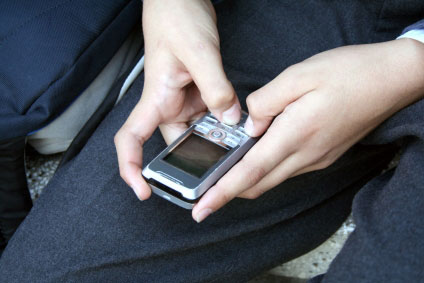Teens Prefer Texting vs. Calling ... Except to Parents

Get the world’s most fascinating discoveries delivered straight to your inbox.
You are now subscribed
Your newsletter sign-up was successful
Want to add more newsletters?

Delivered Daily
Daily Newsletter
Sign up for the latest discoveries, groundbreaking research and fascinating breakthroughs that impact you and the wider world direct to your inbox.

Once a week
Life's Little Mysteries
Feed your curiosity with an exclusive mystery every week, solved with science and delivered direct to your inbox before it's seen anywhere else.

Once a week
How It Works
Sign up to our free science & technology newsletter for your weekly fix of fascinating articles, quick quizzes, amazing images, and more

Delivered daily
Space.com Newsletter
Breaking space news, the latest updates on rocket launches, skywatching events and more!

Once a month
Watch This Space
Sign up to our monthly entertainment newsletter to keep up with all our coverage of the latest sci-fi and space movies, tv shows, games and books.

Once a week
Night Sky This Week
Discover this week's must-see night sky events, moon phases, and stunning astrophotos. Sign up for our skywatching newsletter and explore the universe with us!
Join the club
Get full access to premium articles, exclusive features and a growing list of member rewards.
For teenagers, texting on mobile phones has dethroned actual voice calls when it comes to connecting with their friends, according to a new report released today by the Pew Research Center.
The report also shows that when teenagers do bother with an old-school phone call, it's more often to contact their parents than their peers. This trend reflects a digital divide between generations of mobile phone users but also some psychological strategizing on the part of teens.
Among its many advantages, teens interviewed as part of a focus group said texting is a quick way to say "hi," report where they and their friends are and to get to the point.
"Teens tell us how [texting is] more efficient, how they don’t have to go through the preamble and niceties [of a phone conversation]," said Amanda Lenhart, a co-author of the new study and a senior research specialist who directs the Pew Internet & American Life Project's research on teens, children and families.
But for socially nuanced situations when the inflection and expression of a voice takes precedence over the brevity of emoticons and crafty punctuation, phone calling is still preferred.
"Teens are clever in thinking about interaction they want to have," Lenhart told TechNewsDaily. "Text messaging often causes problems because it is devoid of emotion and tone."
Almost everyone's doing it
Get the world’s most fascinating discoveries delivered straight to your inbox.
The newest Pew report is the last in a series based on a phone survey conducted last summer of 800 youths spanning the ages of 12 to 17, plus one study that also involved their parents.
This survey has revealed that the average teen texter sends and receives 50 messages a day compared to making and fielding just five phone calls.
Two-thirds of the teens surveyed said they are more likely to type out a text to their friends than to call, whereas 78 percent said they are more likely to engage their vocal chords when communicating with their parents.
Three-quarters of 12 to17 year-olds now own cell phones, the report also states, and over seven in ten teens use text messaging nowadays. Those figures represent a big jump from the half of teens who owned cell phones and texted with them back in 2006.
The report also shows that girls text a lot more than guys, sending and receiving about 80 total texts per day compared to teen boys' daily log of about 30 messages.
These results are "in line with what we've seen in the past 10 years, which is that girls are more enthusiastic about any kind of communication tool," Lenhart said.
Keep it on the down-low
Besides basic efficiency, one of the reasons behind the meteoric rise in texting as the preferred means of communication amongst peers for teens is the privacy that the medium affords.
"Teens can [text] under the radar . . . your teacher or parents won't really know what you're up to and it doesn't bother people around you," said study co-author Rich Ling, professor at the IT University of Copenhagen, Denmark and who is affiliated with the University of Michigan in Ann Arbor.
This discreteness is also good for parents who want to avoid embarrassing their children with a phone call, Ling noted, and can instead transmit important information about a pick-up time or ensure that their teens are safe.
Parents out of the texting loop?
Although 71 percent of parents with teenagers aged 12 to 17 years old say they know how to and do text, kids still perceive their elders as being out of the texting loop.
Besides not texting well in general, focus group teenagers said their parents often complained about text lingo – abbreviations such as "LOL" and "idk," which stand for "laughing out loud" and "I don't know," respectively – as well as the frequent lack of capitalization and other linguistic issues. To avoid confusion and getting a lecture on grammar, teens instead opt to call rather than text their folks.
Location updates and traditional checking-in remain common themes for parent-teen communication across both texts and calls, though a bit of selective manipulation by teens in how they address their parents also came out in the focus group conversations.
For example, when teens do decide to text their guardians, they may be making an effort to cover their tracks and not get in trouble for being at a party or the arcade. As the study said: "Since obviously there is no sound when texting, teens can text their parents when the background noise of their location would give away too much information on their whereabouts."
Teens also said that calling up the parents is best when seeking immediate feedback. One boy in middle school summed up teen texting behavior nicely when he told the Pew Research Center study authors: "Most of the time you usually call your parents. You usually call them if it’s really important, or you’re trying to get a hold of them to come pick you up. So most of the time you usually call your parents but with friends you just text pretty much."
- Top 10 Disruptive Technologies
- Teens Text 10 Times Per Hour
- Distracted Driving: The Dangers of Mobile Texting and Phone Calls
 Live Science Plus
Live Science Plus











